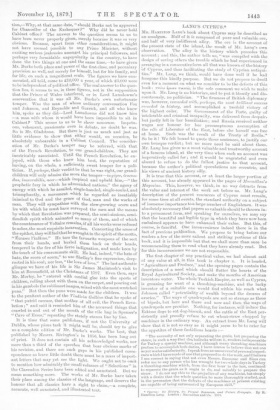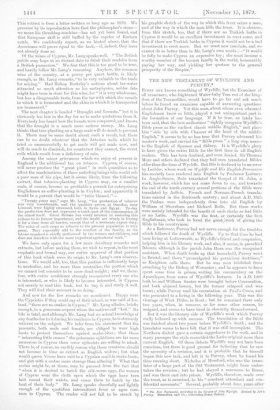LANG'S CYPRUS.* HAMILTON LANG'S book about Cyprus may be described
as an amalgam. Half of it is composed of pure and valuable ore, and half of very indifferent alloy. The ore is the account of the present state of the island, the result of Mr. Lang'e own observation. The alloy is the history which precedes this account ; and this, the author tells us, "was compiled with the
design of saving others the trouble which he had experienced in arranging in a consecutive form all that was known of the history 'of Cyprus, and thus facilitating the study of Cyprian antiqui- ties." Mr. Lang, we think, would have done well if he had foregone this kindly purpose. But we do not propose to dwell even for a moment on what we consider to be the defects of this book : 7rxiop 14cterv waan4c, is the sole comment we wish to make ' upon it. Mr. Lang is no historian, and to put it bluntly and dis- courteously, no politician. "The firmness of British diplomacy was, however, rewarded with, perhaps, the most brilliant success recorded in history, and accomplished a twofold victory of
the highest order. The Government of the Porte, guilty of intolerable and criminal incapacity, was delivered from despair, but justly left in her humiliation ; and Russia received neither
wages nor honour for her presumptuous assumption of the rO'le of Liberator of the East, before she herself was free at home. Such was the result of the Treaty of Berlin."
So be it ! We felt bound to quote these sentences, to justify our own brusque verdict ; but no more need be said about them.
Mr. Lang has given us a most valuable and trustworthy account of a famous island, at the very time when such an account was imperatively called for ; and it would be ungrateful and even absurd to refuse to do the fullest justice to that account, because the author's political speculations are eccentric, and his views of ancient history silly.
It is true that this account, or at least the larger portion of this account, has already appeared in the pages of Macmillan's Magazine. This, however, we think, in no way detracts from the value and interest of the work set before us. Mr. Lang's description of the present resources of Cyprus must remain, for some time at all events, the standard authority on a subject of immense importance to a large number of Englishmen. It was absolutely necessary that papers so valuable should be thrown in- to a permanent form, and speaking for ourselves, we may say that the beautiful and legible type in which they have now been embalmed appears to have enhanced their value. But this, of course, is fanciful. One inconvenience indeed there is in the fact of previous publication. We propose to bring before our
readers a few of the more salient and striking portions of this book, and it is impossible but that we shall more than once be recommending them to read what they have already read. But for this inconvenience we are not responsible.
The first chapter of any practical value, we had almost said of any value at all, in this book is chapter x. It is headed, "Agriculture and Produce," and the opening pages contain the description of a need which should flutter the hearts of the Royal Agricultural Society, and make the mouths of American inventors water. The whole Turkish Empire, as well as Cyprus, is groaning for want of a threshing-machine, and the lucky
inventor of a suitable one would find within his reach what Johnson called "potentiality of wealth beyond the dreams of
avarice." The ways of quadrupeds are not so strange as those of bipeds, but here and there and now and then the ways of quadrupeds are peculiar. Nothing, for instance, will induce the Eskimo doge to eat dog-biscuit, and the cattle of the East per- sistently and proudly refuse to eat wheat-straw chopped by machines in the ordinary way. An extract from Mr. Lang will show that it is not so easy as it might :seem to be to cater for the appetites of these fastidious beasts :—
"The necessity of not only separating the grain, but preparing the straw, in such a way that the.bullocks will eat it, renders indispensable for Turkey a special machine, and although many threshing-machines profess to accomplish both duties, I have reason to believe that not one as yet works satisfactorily. I speak from an unsuccessful personal experi- ence which I have made of ono that proposed to do the work, and I believe I am correct in saying that not even Messrs. Ransom° and Sims can refer me to any person who has wrought for two whole days in Turkey a threshing-machine which, from the first hour to the last, continued to separate the grain as it ought to do, and suitably to prepare the straw. I do not say this to the prejudice of any machinist, but simply with a desire that the whole question be more thoroughly studied, and in the persuasion that the defects of the machines at present existing are capable of being surmounted by European skill."
* Cuprus: its History, its Present Resourcee, and Future Prospects. By B.
Hamilton Lang. London Macmillan and Co. 1878. This extract is from a letter written so long ago as 1870. We presume by its reproduction here that the philosopher's stone— we mean his threshing-machine—has not yet been found, and that European skill is still baffled by the caprice of Eastern cattle. We confidently expect, as we hinted above, that the Americans will prove equal to the task,—if, indeed, they have not already done so. Of the wines of Cyprus, Mr, Lang speaks well. " The British public may hope at no distant date to drink their madeira from a British possession." We fear that this is too good to be true, and hardly follow Mr. Lang'a reasoning. Anyhow, the common wine of the country, at a penny per quart bottle, is likely enough, as Mr. Lang remarks," to be very valuable to the trade for mixing." Had Bishop Berkeley's notions about tar-water attracted as much attention as his metaphysics, nobler fate might have been in store for this wine, for "it is very wholesome, but has a disagreeable taste, from the tar with which the vessels in which it is fermented and the skins in which it is transported are besmeared."
The next chapter is headed "Drought and Locusts," but it is obviously too late in the day for us to make quotations from it. Everybody has hearil how the locusts were conquered, and knows that the drought is a much more serious enemy. Mr. Lang thinks that tree-planting on a large scale will do much to prevent it. There may be some doubt about such a result, but there can be no doubt whatever that the Artesian wells which he tried so unsuccessfully to get made will get made now, and will do much to diminish, for counteract they cannot, the worst evils which result from a deficiency of rain.
Among the 'minor grievances which we enjoy at present in England is the additional tax on tobacco. Cyprus, of course, will never produce the " great plant " in such quantities as to affect the machinations of those unfeeling beings who would rob a poor man of his pipe, but it seems likely, from the following extract, that tobacco-planting in Cyprus may, on a smaller scale, of course, become as profitable a pursuit for enterprising Englishmen as coffee-planting is in Ceylon ; and apparently it would be a pursuit that would be "twice blessed :"—
" Twenty years ago," says Mr. Lang, "the production of tobacco was very considerable, and the qualities grown at Omodos, near Linmsol, were highly esteemed, both in Syria and Egypt. To-day the production does not represent a tenth-part of the consumption of the island itself. Great Britain has every interest in restoring this culture to its former importance, and she would act wisely in freeing it for a time from all burden, except that of a moderate export duty. The value of such crops as tobacco to the present population is very great. They especially add to the comfort of the family, as the labour required is chiefly performed by the women and children, and does not interfere with the more important agricultural work."
We have only space for a few more desultory remarks and extracts, but before making them, we wish to repeat, in the most emphatic and formal way, our entire approval of that portion of this book which owes its origin to Mr. Lang.'s own observa- tions. We would add, too, that this portion is sufficiently large to neutralise, and far more than neutralise, the portion which we cannot but consider to be mere dead-weight ; and we, there- fore, with entire confidence strongly recommend every one who
is interested, or who is likely to become interested, in Cyprus not merely to read, this book, but to buy it and study it well. They will find their account in so doing.
And now for the few remarks we mentioned. Happy were the Cypriotes if they could say of their island, as was said of Ice- land, "there are no snakes in Cyprus." Mr. Lang alludes, briefly enough, to a gruesome serpent whom the natives call " kofi." Its bite is fatal, and although Mr. Lang had no actual knowledge of any deaths due to it during his residence in Cyprus, he is obviously reticent on the subject. We infer from his statement that the peasants, both male and female, are obliged to wear high boots to protect themselves against snake-bites; that those "interesting little cusses" the poisonous ophidians are far more numerous in Cyprus than some optimists are willing to admit. There is, of course, no earthly reason why these creatures should not become in time as extinct as English wolves ; but what would queen Venus have said to a Cyprian maid in snake-boots, and girt with a cestns more strange than alluring F' What that cestus might be, at times, may be guessed from the fact that "when it is desired to hatch the silk-worm eggs, the women of Cyprus wear the cloth upon which the eggs have been laid round their waists, and cause them to hatch by the heat of their body." Mr. Lang speaks cheerfully and lightly enough of the quotidian intermittent fever or ague com- mon to Cyprus. The reader will not fail to be struck by his graphic sketch of the way in which this fever seizes a man,. and of the way in which the man kills the fever. It is obvious,, from this sketch, too, that if there are no Turkish baths in Cyprus it would be an excellent investment to erect some, and that if there are Turkish baths in Cyprus it would not be a bad investment to erect more. But we must now conclude, and we cannot do so better than in Mr. Lang's own words :—" It would be folly to make Cyprus an expensive toy ; she must become a- worthy member of the busiest family in the world, honourably paying her way, and yielding her quotum to the general) prosperity of the Empire."



































 Previous page
Previous page